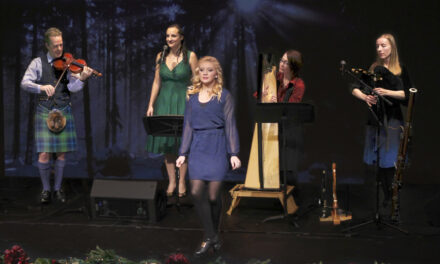You might say that staged plays are ideas made flesh, but whether that flesh lives is another matter. Deep Dish Theater closes its 13th season this month with an ambitious staging of Life Is a Dream, the English language translation and adaptation by Nilo Cruz of the 1635 work by Pedro Calderón de la Barca. It is a play of ideas, exploring differing philosophies, such as the divine right of kings, and the interplay of fate and free will. Like the better-known novel of 30 years earlier, Cervantes’ Don Quixote (and for that matter, the even earlier Shakespeare play A Midsummer Night’s Dream), Life Is a Dream travels through the borderlands among the states of reality, dream, illusion, and delusion, the home territory of play-makers of all times. Sadly, on opening night, its ideas lacked profundity and its flesh was cold.
The play struggles with nearly insurmountable burdens. It carries many important but unwieldy ideas in its rough basket — ideas that drama has toted at least since the Greeks — notably the power relations between father and son (and by extension, between king and the people). Its language, in this version, is not capable of leading us to fresh considerations of these old ideas and conundrums; instead, it presents profound concerns as clichés. Director Marc Williams seems to have attempted a solution that only worsens the problem. He has the actors declaim in an empty, stagey manner that never reaches the level of self-aware stylization, which might have redeemed its nerve-grating quality. You would not need all the fingers on one hand to count the number of flashes of real emotion in the entire hour and forty-five minutes.
Its characters, insofar as they are actually people and not simply chess pieces in a mind game, range from deeply repugnant to mildly despicable. The sole exception is the fool, Clarin, refreshingly alive in actor David Hudson. Of course, this is the only character who gets killed off.
Alphonse Nicholson as the young prince Segismundo had a few good moments, but not even he could bring that young man to life under this directorial scheme. Nicholson is capable of great subtlety, and has an unusually powerful stage presence, but his charisma and innate sensitivity to the human condition were wasted here. Amber Wood valiantly attempted to imbue Rosaura with courage, honor and grit, but she could not do anything but simper when the playwright consigned her to hell in the form of marriage to the Duke Astolfo. He is a man without a single redeeming quality, as was Daniel Doyle’s performance of the character. His cousin and would-be wife, the duchess Estrella (Anne-Caitlin Donohue), is another non-person, a pawn casually handed over to the prince. (She too simpers prettily. Neither playwright nor translator seems to have any sense what a woman might be.) The king Basilio (John Boni) and his counselor Clotaldo (Peter Battis) are little better, and although they receive Segismundo’s forgiveness in the end for their torture of him, they did not receive mine.
The set, however, is quite good (Lex van Blommestein), and Pamela Bond’s costumes are striking and tell as much about the characters as their speeches do. Lighting (Jenni Mann Becker) didn’t seem entirely worked out on opening night, as sometimes actors’ faces were in the dark during key speeches — but perhaps lighting cues were missed. Michael Betts II has designed some good sound, but its coming and going seemed jerky and its timing off — again, likely a problem that will have been resolved by the next show.
Life Is a Dream continues through Saturday, May 31. For more details on this production, please view the sidebar.











